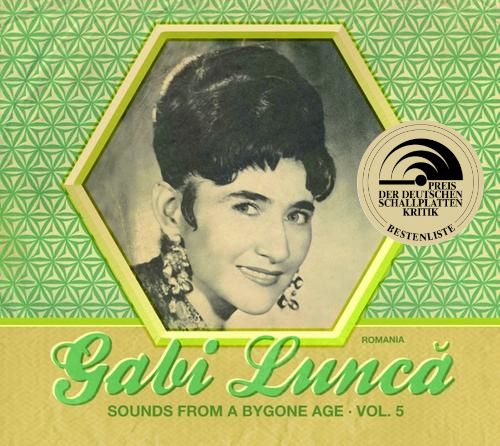
Recordings from the former Romanian comunist state record label, featuring Gypsy singer Gabi Lunca.
Visitors to Bucharest in the grey 1980s could witness two different worlds: Official state folklore with songs of the golden era proclaimed by Ceausescu and lively suburban music (muzica de mahala), which at that time was played at private parties. Gabi Luncă also spent many years singing at weddings, and although from the beginning of the 1990s her only performances were in Pentecostal churches, her voice remains unforgotten in Romania. Her songs are the quiet, melancholic songs of passion and yearning for one's home, mother, or sweetheart; songs to lift the weight from one's soul. Included among Gabi Luncă's greatest hits are: "Omul Bun n-are noroc" (The good have no luck) and "Superata sint pe lume" (I am sad in this world). Gabi Luncă's silvery, lightly strained singing was often copied, but never equalled, although as the accordion player Victor Gore remembers, she "always sang slightly out of time". Alongside Romica Puceanu, Gabi Luncă was the most valued performer of Romanian muzica lautareasca. Yet unlike her sensuous and hard-drinking rival, Gabi Luncă's life, partly because of the four children she had with the accordion player Ion Onoriu, was spent in familiar seclusion and without excess. Not only for this reason, but also because of her carefully selected stage clothes and her great professionalism, she was also referred to as the Tziganca de matase, the silken Gypsy woman. Gabi Luncă played with Aurel and Victor Gore's taraf until her marriage to Ion Onoriu. Later she worked with the trumpeter Costel Vasilescu, the tzimbal god Toni Iordache and other big names from the Bucharest Lautari scene in the state-owned Electrecord studio. In the final years of the Ceausescu regime her urbane repertoire was only played on the radio early in the morning. Back then her real fans would set their watches by the radio programme and at five o'clock, before they left for the factory, they would listen to the sparkling voice of this singer with a mug of cold Nescafé. Gabi Luncă comes from Varbilau, a village in the Prahova valley, where restaurant owners from Ploiesti or from the Black Sea are happy to hire musicians up to today. Over the course of a career which began with folk songs, Gabi Luncă has successfully stylized herself as the Grand Dame of Lautari music. There is a children's home next to her estate in Bucharest's Tei quarter, financed by the Pentecostal community. Gabi Luncă had first-hand experience of privation. Born in 1938, and motherless from the age of three, she grew up as one of violinist Dumitru Luncă's 12 children and has not forgotten these early years on the margins of society. Luckily there was the radio - and on it were played the songs of her great icon Maria Lataretu, who she was to meet in a radio studio on her first trip to Bucharest. In the mid-fifties Gabi Luncă took part in one of the many regional amateur musical contests held at the time. Following 49 competitors the very young singer was the last on the stage, wearing a dark skirt and white blouse. She sang with a power and virtuosity which brought her thunderous applause as well as the winner's certificate. The slim country girl, with her cotton socks full of holes and wearing shoes that were far too big for her, then went along and introduced herself at Romanian broadcasting corporation in the capital. Shortly after this the 18-year old singer was called up by the renowned orchestra leader Ionel Budisteanu, who wanted to record several songs from the suburbs with Gabi Luncă as soloist. The first record, her first money, and then a few years back in the country before Gabi Luncă, following an unhappy marriage, finally moved to Bucharest and married the accordion player Ion Onoriu at the age of 26. Ion Onoriu comes from Fantanele, a village near Bucharest. With him she was able to perform regularly in garden cafés, appeared on radio and television (being an attractive woman she appeared there more frequently than any other Lautari singer) and also played at Romanians and Gypsies' private parties at weekends. Musicians such as Luncă earned more money in one evening than a factory worker in a whole month. The singer only just escaped death during an earthquake in March 1977. She should actually have been singing that evening in the local cultural centre in the town of Zimnicea, but because the band leader Ion Onoriu found the venue too small, the tour caravan (including the tzimbal player Toni Iordache among others) turned straight around and went on to Slatina, Zimnicea was wiped off the map and completely destroyed that evening. From the beginning of the 1990s Gabi Luncă has only sung at the services of the Bucharest Pentecostal community. The wedding business became an exhausting duty for her husband following the revolution. She herself had no interest in competing with the scantily clad new stars of the nascent manele music. All of these provided the motives for her withdrawal from the secular music business. "We stopped when we achieved terrific success, but we did it out of respect for our music". Gabi Luncă, the diva of the Lautari scene, will turn 70 this year, time for a rediscovery through recordings from the Bucharest archives.
Share via:
